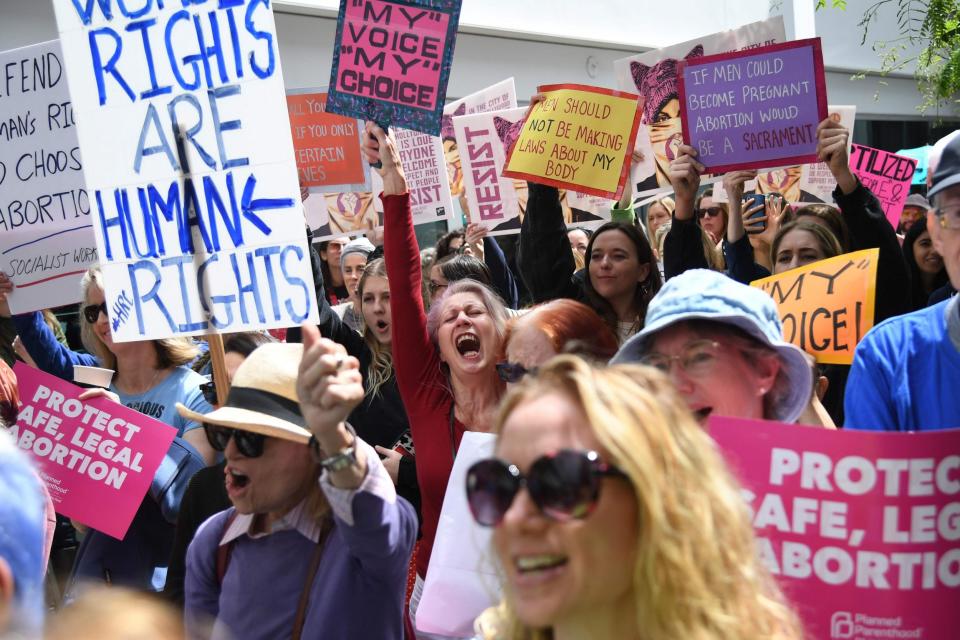Abortion ban protests: Thousands demonstrate against new restrictive laws across America
Massive protests opposing a series of bans against abortions have continued for several days after one of the most stringent abortion laws in the nation was signed into law in Alabama last week.
Crowds of demonstrators on Capitol Hill were joined by prominent women’s rights activists and politicians on Tuesday, including 2020 presidential hopeful Kirsten Gillibrand, for a rally titled #StopTheBans.
“Our democracy only works when the people of this country stand up and demand it,” the New York senator said to cheers. “Do not allow this moment to pass without putting everything you have behind it … organise, advocate and vote.”
Across the country, Americans from all walks of life marched in major cities and small towns to oppose bans like the one in Alabama, which makes performing an abortion a felony in nearly all cases.
The bill, signed by Republican Governor Kay Ivey, is effectively designed to set up a lengthy legal battle that could result in the Supreme Court revisiting a decades-old decision for Roe v. Wade, which deemed abortion a Constitutionally-protected right.
“To the bill’s many supporters, this legislation stands as a powerful testament to Alabamians’ deeply held belief that every life is precious and that every life is a sacred gift from God,” the governor said in a statement while signing the bill on Wednesday.
Hundreds of demonstrators then marched to the Alabama Capitol on Sunday to protest the state’s newly approved abortion ban, chanting “my body, my choice!” and “vote them out!”
In a statement addressing the cheering crowd, Planned Parenthood Southeast President Staci Fox said “Banning abortion does not stop abortion. It stops safe abortion.”
Governors in Kentucky, Mississippi, Ohio and Georgia have also approved bans on abortion once a fetal heartbeat is detected, which can happen as early as the sixth week of pregnancy.
But none of the laws have actually taken effect, and all are expected to be blocked by the courts as the legal challenges play out with an ultimate eye on the Supreme Court.
Marchers have said the measures are energising supporters of legalised abortion, and they say they are digging in for a legal and political fight. Along the route they took, the protesters passed by scattered counter-demonstrators raising signs against abortion.
The Alabama law would make it a felony, punishable by up to 99 years or life in prison to perform an abortion. There would be no punishment for the woman receiving the abortion.
But the protest outside the Alabama Capitol on Sunday occurred in a state where a majority of voters recently agreed to put anti-abortion language in the Alabama Constitution. Fifty-nine per cent of state voters in November approved the constitutional amendment saying the state recognises the rights of the “unborn.”
As most people know, and for those who would like to know, I am strongly Pro-Life, with the three exceptions - Rape, Incest and protecting the Life of the mother - the same position taken by Ronald Reagan. We have come very far in the last two years with 105 wonderful new.....
— Donald J. Trump (@realDonaldTrump)
Donald Trump, while not mentioning Alabama’s law, wrote in a weekend tweet that he is strongly “pro-life” but favours exceptions.
“As most people know, and for those who would like to know, I am strongly Pro-Life, with the three exceptions - Rape, Incest and protecting the Life of the mother - the same position taken by Ronald Reagan,” The president wrote in a series of tweets.
Alabama’s abortion ban would go into effect in six months if it isn’t blocked by legal challenges.
Additional reporting by AP

 Yahoo News
Yahoo News 

